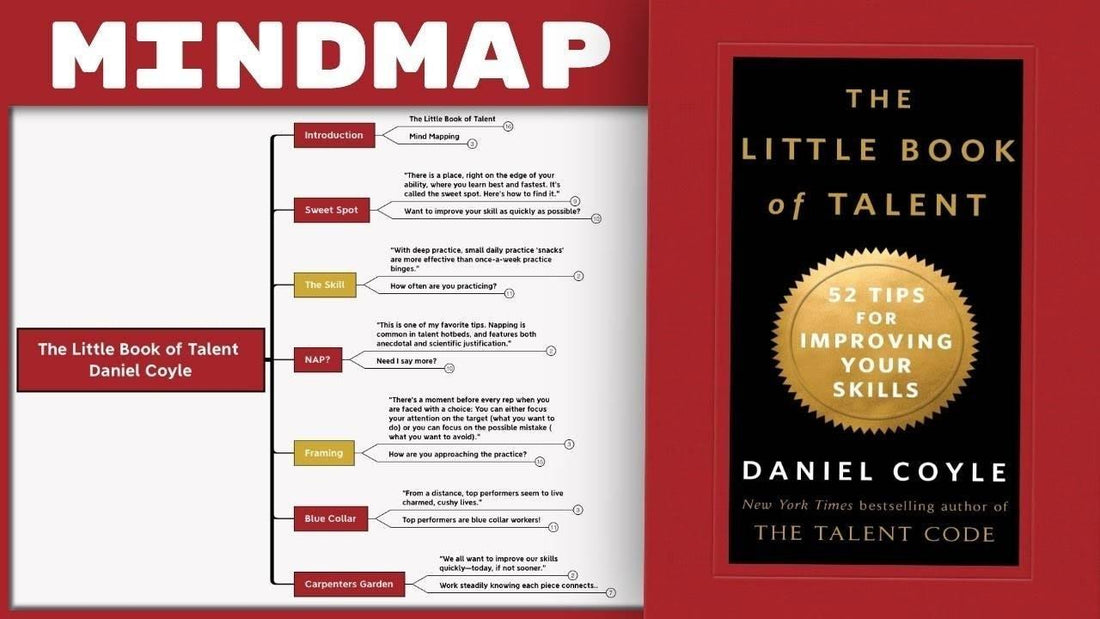Video Book Summary
Download all of the Mind Maps here.
Book Summary Notes
The Little Book of Talent
“What follows is a collection of simple, practical tips for improving skills, taken directly from the hotbeds I visited and the scientists who research them."
"The advice is field-tested, scientifically sound, and, most important, concise. Because when it comes down to it, we’re all navigating busy, complex lives."
"Parent or teacher, kid or coach, artist or entrepreneur, we all want to make the most of our time and energy. When it comes to developing our talents, we could use an owner’s manual, something to say Do this, not that. We could use a master coach that tucks in our pocket. We could use a little book.
"Whatever talent you set out to build, from golfing to learning a new language to playing guitar to managing a startup, be assured of one thing: You are born with the machinery to transform beginner’s clumsiness into fast, fluent action."
"That machinery is not controlled by genes, it’s controlled by you. Each day, each practice session, is a step toward a different future. This is a hopeful idea, and the most hopeful thing about it is that it is a fact.”
A little book of mental models for self improvement!
This book is all about how your brain is built..
And how you can use that brain to accomplish, learn or create great things!
It's about how talent is CREATED and about how we learn new things..
Mental Models:
These are ways of looking at something that are easily stick in our minds..
Mental Models describe something that is almost universal person to person and help us make changes in the moment or with forthought..
These models are tested!
Daniel Coyle wrote the smash hit The Talent Code
That book dives much deeper into the science and practice of how successful people become that way..
This book is something you could reference quickly but also distills some of that information into useful and actionable advice!
Sweet Spot
“There is a place, right on the edge of your ability, where you learn best and fastest. It’s called the sweet spot. Here’s how to find it."
Comfort Zone
- Sensations: Ease, effortlessness. You’re working, but not reaching or struggling.
- Percentage of Successful Attempts: 80 percent and above.
Sweet Spot
- Sensations: Frustration, difficulty, alertness to errors. You’re fully engaged in an intense struggle—as if you’re stretching with all your might for a nearly unreachable goal, brushing it with your fingertips, then reaching again.
- Percentage of Successful Attempts: 50-80 percent.
Survival Zone
- Sensations: Confusion, desperation. You’re overmatched: scrambling, thrashing, and guessing. You guess right sometimes, but it’s mostly luck.
- Percentage of Successful Attempts: Below 50 percent.
Want to improve your skill as quickly as possible?
Pay attention to how difficult you make your practice..
- When we practice things that are below our current level of ability we don't get much better..
- When we practice things far above our level we struggle and can't learn..
But when we find the exact right match for our abilities..
- The place where we are stretching, learning and fully engaged just to succeed 50-80% of the time..
- That is where we're going to learn, grow and adapt the fastest!
How can we find this spot?
- From my experience it's all about paying attention to mental state (are you feeling effortless or bored, awareness or flow or confusion and desperation).
- The other measure we can look into is how successful you're feeling when doing something.. Are you getting it right 50-80% of the time?
- Then it's a game of adjustments! Sometimes you'll need to make things a little easier and sometimes you'll need to turn up the dial.
The Skill
“With deep practice, small daily practice ‘snacks’ are more effective than once-a-week practice binges."
"The reason has to do with the way our brains grow—incrementally, a little each day, even as we sleep. Daily practice, even for five minutes, nourishes this process, while more occasional practice forces your brain to play catch-up. Or, as the music education pioneer Shinichi Suzuki puts it, ‘Practice on the days that you eat.’"
"The other advantage of practicing daily is that it becomes a habit. The act of practicing—making time to do it, doing it well—can be thought of as a skill in itself, perhaps the most important skill of all. Give it time. According to research, establishing a new habit takes about thirty days.”
How often are you practicing?
The greats.. Practice ever single day!
- Actually Daniel tells us that's the number one skill of successful people..
- They are able to practice deep every single day!
Now this doesn't mean to grind yourself into the dirt everyday at practice..
- Really what he's talking about here is spaced repetition!
- Focus deeply for a shorter period of time everyday vs focusing shallow for a long period of time.
- Focus everyday rather than one big practice every single week.
The habit of practicing:
- Basically in order to get good at anything you're going to need to practice a lot!
- The best way to make sure that happens is to develop the habit of practice..
- Pick something really small (Thanks Tiny Habits) and practice it for 2 minutes a day at first! But keep up that habit.. Eventually growing your time everyday. That's how you successfully learn.
NAP?
“This is one of my favorite tips. Napping is common in talent hotbeds, and features both anecdotal and scientific justification."
"The anecdotal: Albert Einstein was good at physics, and he was really good at his daily post- lunch twenty-minute snooze. Other famous nappers include Leonardo da Vinci, Napoleon Bonaparte, Winston Churchill, Thomas Edison, Ronald Reagan, John F. Kennedy, and John D. Rockefeller. Spend time with any professional athletic team, and you’ll find they’re also professional nappers."
"The science: Napping is good for the learning brain, because it helps strengthen the connections formed during practice and prepare the brain for the next session.”
Need I say more?
Probably you don't need much more of an incentive to take a nap..
- But perhaps you're worried that taking a nap will bring down your productivity?
- Well some of the most productive and influential people in all of history were nappers!
Plus they science is pretty clear..
- Memories, learnings and connections in the brains get solidified when we sleep!
- All the practice, learning and work you do during the day doesn't stick unless you get a good nights sleep and a nap can be a part of that.
So when?
- Well I tend to think the lunch time nap is a good place to go.. But most of us won't really have time to fully doze off!
- So instead I say we lay down, close our eyes and focus on breathing for 20 minutes..
- Some people might call this meditation, but to me it's like a nap! If I fall asleep? Great! But if I don't it's an extra 20 minutes of mediation I might not have taken.
Framing
“There’s a moment before every rep when you are faced with a choice: You can either focus your attention on the target (what you want to do) or you can focus on the possible mistake (what you want to avoid)."
"This tip is simple: Always focus on the positive move, not the negative one."
"For example, a golfer lining up a putt should tell herself, ‘Center the stroke,’ not ‘Don’t pull this putt to the left.’ A violinist faced with a difficult passage should tell himself, ‘Nail that A-flat,’ not ‘Oh boy, I hope I don’t miss that A-flat.’"
"Psychologists call this ‘positive framing,’ and provide plentiful theories of how framing affects our subconscious mind. The point is, it always works better to reach for what you want to accomplish, not away from what you want to avoid.”
How are you approaching the practice?
Might be more important than the practice itself..
- How many reps does it take to get good at something? Of course it varies..
- But one thing you can be sure of is it takes more reps if you place your focus on what NOT to do rather than what you should do!
- Kind of like in dieting.. It's a lot easier to focus on eating MORE healthy food than LESS food in general!
Why positive framing?
- Inside his book 'what to say when you talk to yourself' Dr Shad Helmstetter explains that the mind will believe whatever you tell it!
- And it doesn't understand context..
- The mind doesn't know the difference between:
Don't miss this shot
Miss this shot
Setting up cues:
Reminding yourself to frame things in a positive way is an important (sometimes not natural) practice..
- Step 1: NOTICE yourself framing something in the negative..
- Step 2: LET GO of the negative frame..
- Step 3: REPLACE with a new positive frame..
Blue Collar
“From a distance, top performers seem to live charmed, cushy lives."
"When you look closer, however, you’ll find that they spend vast portions of their life intensively practicing their craft.
"Their mind set is not entitled or arrogant; it’s 100-percent blue collar: They get up in the morning and go to work every day, whether they feel like it or not."
"As the artist Chuck Close says, ‘Inspiration is for amateurs.’”
Top performers are blue collar workers!
Everyday they show up..
- Most days it's repetitive practice on the basics.
- Some days they don't feel like going.
- Everyday they leave tired.
That's actually their secret!
- They keep showing up.. They are insanely consistent!
- That's how they stay ahead, compete at a high level or finish a lot of projects..
- Simply showing up is 90% of the battle!
How can you stay consistent?
- Set the goal of showing up at x time on y day vs setting the goal to finish or win..
- Once you build the habit of showing up each day the contest, project or goal will take care of itself!
Carpenters Garden
“We all want to improve our skills quickly—today, if not sooner."
"But the truth is, talent grows slowly. You would not criticize a seedling because it was not yet a tall oak tree; nor would you get upset because your skill circuitry is in the growth stage. Instead, build it with daily deep practice.
"To do this, it helps to ‘think like a gardener and work like a carpenter.’ I heard this saying at Spartak. Think patiently, without judgment. Work steadily, strategically, knowing that each piece connects to a larger whole.”
Work steadily knowing each piece connects..
This is such an important point!
- Often we focus our efforts on the 'end goal' and trying to do everything we can to get there as quickly as possible..
- This often leads to shortcuts, unhappiness and disappointment when we can't control the speed at which we improve!
Consistent mindful attention to the moment..
- This again is all about showing up, being willing to work hard and knowing that you're contributing towards your goal!
- But with a twist.. Bringing yourself to the moment fully, with awareness and intention is where true change happens!
- Focus on the NOW instead of the RIGHT NOW

